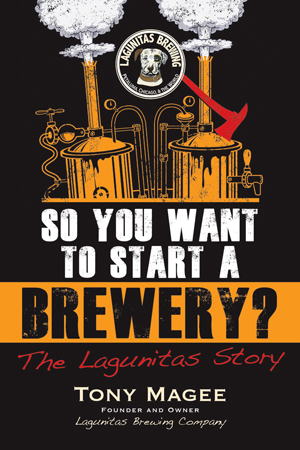So You Want to Start a Brewery?: The Lagunitas Story
We are getting inundated with books on the new brewing industry, but So You Want to Start a Brewery?: The Lagunitas Story (Chicago Review Press, Paperback, $17.95, 224 pp) will take readers places no other beer book has gone. Tony Magee is quite the craftsman, not only with beer, but also with this wonderful and revealing read. Magee is as much an artist with words as he is with malt and hops.
Page after page, Magee takes us on a roller-coaster ride of the emergence of one of America’s leading breweries, while also opening up his soul, showing us a different kind of entrepreneurial spirit. For Magee, problems often bring their own solutions, at a minimum usually a new role player who will help him on is way. Each paragraph could careen from Socrates to Frank Zappa, with chaos theory tossed in for good measure. The man has an amazing collection of material locked in that brain of his.
The beginning and conclusion of the book both display what Magee thinks are the critical elements of running a new brewery—how to use money and staying true to customers. He opens with a highly revealing discussion of financing a brewery and financing growth. Throughout this narrative the significance of the people he met and his amazing financial creativity looms large, directing his ability to grow his brewery. Magee’s concluding chapter revolves around the social contract with customers that brewers assume when joining this business. Those without this connection will have trouble succeeding.
Beer lovers will love the sections on naming the beers, building their labels and formulating the recipe. Magee is very candid about the whole process of how new beers come to be. Given he knew less about brand building than he did about building a brewery, he “had to innovate.” He also writes about labels as an “elemental self” escaping its constraints, with Magee’s help.
Throughout the narrative arch of The Lagunitas Story, Magee gives credit to the industry players, past and present, successes and failures. He clearly views himself as part of an evolutionary process, one that began a long time ago and of which he is merely a steward.


Leave a Reply